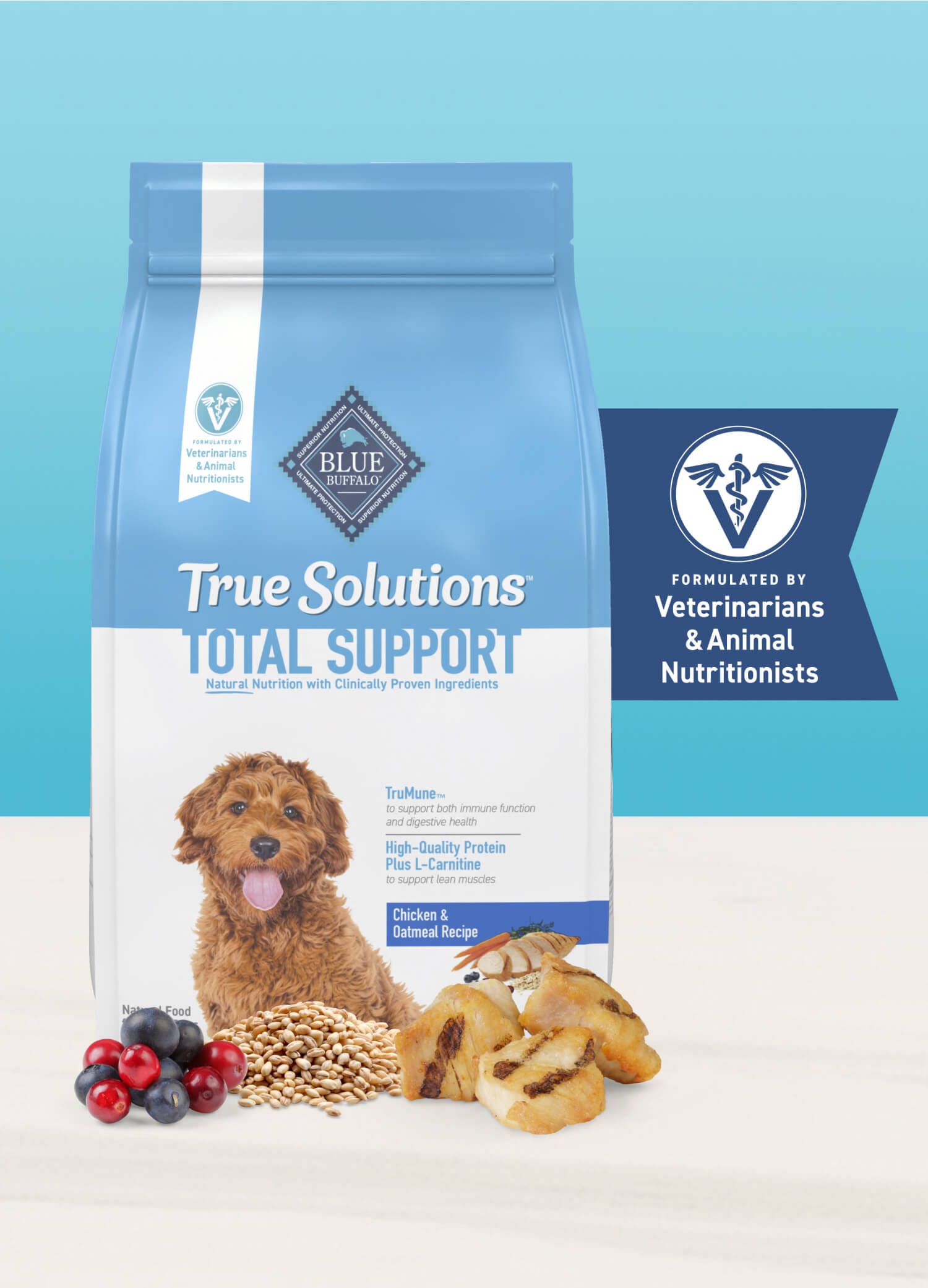Caring for your dog’s digestive well-being is paramount for their overall health and happiness. BLUE True Solutions™ Digestive Care Chicken & Oatmeal Recipe is specifically formulated by veterinarians and PhD animal nutritionists to naturally support your dog’s digestive system. This veterinarian-recommended formula features prebiotic fiber, clinically proven to aid digestion, and is crafted with high-quality, natural ingredients. If you’re looking for a way to gently support your dog’s stomach and promote a healthy gut, this chicken-first recipe offers a balanced and nutritious solution.
Understanding the Ingredients for Optimal Digestion
The effectiveness of BLUE True Solutions™ Digestive Care lies in its carefully selected wholesome ingredients. Each component plays a vital role in supporting your dog’s digestive health and providing essential nutrients.
- Chicken: As the first ingredient, real deboned chicken provides a high-quality protein source essential for muscle development and overall body function.
- Brown Rice: This natural whole grain is a source of essential B vitamins, minerals, and complex carbohydrates, providing sustained energy and dietary fiber to aid digestion.
- Fructooligosaccharides: These are plant-derived prebiotic fibers that work by increasing the population of beneficial bacteria (probiotics) in the intestine, which is crucial for maintaining a healthy gut environment.
- Flaxseed: Rich in omega-3 fatty acids, flaxseed also contributes fiber, supporting healthy digestion and promoting shiny skin and a lustrous coat.
- Chicken Meal: This concentrated source of protein provides additional energy and nutrients while also being easily digestible.
- Canola Oil: This oil contributes calories for energy and provides a balance of omega-3 and omega-6 fatty acids, which are beneficial for skin and coat health.
- Oatmeal: A nutritious grain, oatmeal is rich in B vitamins and serves as a high-quality carbohydrate source to fuel your dog’s daily activities.
- Cranberries: Packed with antioxidants, cranberries offer vitamins C, E, and K, along with manganese, contributing to your dog’s overall well-being.
Exclusive LifeSource Bits™ for Enhanced Nutrition
A unique feature of BLUE True Solutions™ formulas is the inclusion of exclusive Antioxidant-Rich LifeSource Bits™. These are a precise blend of antioxidants, vitamins, and minerals meticulously chosen by veterinarians and animal nutritionists. They are cold-formed to preserve nutrient potency, helping to support:
- Immune System Health: Antioxidants help combat free radicals and support a robust immune response.
- Life Stage Requirements: The blend provides essential nutrients tailored for adult dogs.
- Healthy Oxidative Balance: This contributes to cellular health and overall vitality.
By minimizing heat exposure during manufacturing, the sensitive nutrients in LifeSource Bits™ are retained, offering maximum benefit to your dog.
The True BLUE Promise: Quality and Transparency
BLUE Buffalo is committed to providing the best for your pet, and the True BLUE Promise outlines this dedication:
- Real Deboned Chicken First Ingredient: Ensures a high-quality protein source.
- NO Chicken (or Poultry) By-Product Meals: Avoids lower-quality fillers.
- NO Corn, Wheat or Soy: These common allergens are excluded.
- NO Artificial Flavors or Preservatives: Ensures natural goodness.
Feeding Guidelines for Optimal Health
It’s important to provide the correct amount of food to maintain your dog’s optimal body condition. The following table provides a general guideline for daily feeding amounts based on your dog’s weight. Remember that individual needs may vary.
| Weight (lbs.) | Cups per Day |
|---|---|
| Up to 15 | ¼ – 1 ¼ |
| 16 – 25 | 1 ¼ – 1 ¾ |
| 26 – 40 | 1 ¾ – 2 ½ |
| 41 – 60 | 2 ½ – 3 ¼ |
| 61 – 80 | 3 ¼ – 4 ¼ |
| 81 – 100 | 4 ¼ – 5 |
| Over 100 | 5 cups + ½ cup for each additional 20 lbs. |
Calorie Content: 3,778 kcal/kg, 394 kcal/cup. Use a standard 8-oz. measuring cup.
Meal Frequency:
- Small Breed: 1 Meal Per Day
- Medium/Large Breed: 2 Meals Per Day
Transitioning to BLUE: When introducing BLUE True Solutions™ to your dog’s diet, gradually mix it with their current food over 14 days to allow their digestive system to adjust.
- Days 1–4: 25% BLUE, 75% old food
- Days 5–8: 50% BLUE, 50% old food
- Days 9–11: 75% BLUE, 25% old food
- Days 12–14: 100% BLUE
Preparation Options:
- Dry: Serve directly from the bag for a crunchy, delicious meal.
- Dry with Water: Add warm water to enhance flavors and aroma.
Always ensure your dog has access to a clean bowl of cool, fresh water. If you are unsure about the appropriate portion size for your dog, consult your veterinarian.
Guaranteed Analysis
BLUE True Solutions Digestive Care Chicken & Oatmeal Recipe for Adult Dogs is formulated to meet the nutritional levels established by the AAFCO Dog Food Nutrient Profiles for maintenance.
| Ingredient | Percentage |
|---|---|
| Crude Protein | 24.0% min. |
| Crude Fat | 13.0% min. |
| Crude Fiber | 6.0% max. |
| Moisture | 10.0% max. |
| Calcium | 1.0% min. |
| Phosphorus | 0.7% min. |
| Vitamin E | 300 IU/kg min. |
| Omega 3 Fatty Acids* | 0.75% min. |
| Omega 6 Fatty Acids* | 2.5% min. |
| Ascorbic Acid (Vit. C)* | 100 mg/kg min |
*Not recognized as an essential nutrient by the AAFCO Dog Food Nutrient Profiles.
By choosing BLUE True Solutions™ Digestive Care, you are providing your dog with a superior nutritional foundation designed to support their digestive health and contribute to a long, happy life.

